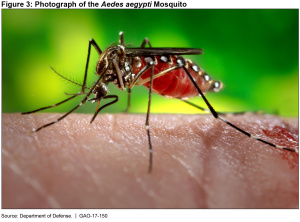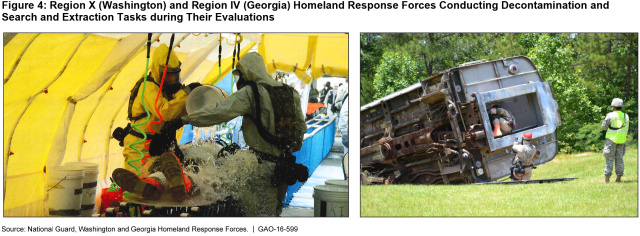If Disaster Strikes, How Is DOD Prepared to Help?
 Another way DOD could be helpful is in dealing with the ramifications of a pandemic. The U.S. Army estimates that if a severe infectious disease pandemic were to occur in the United States today, over 1 million people could die. In the event of such a pandemic, DOD could help with logistics and transportation, such as distributing medical supplies and other necessities to affected areas.
However, we found that DOD may not be in a position to provide this type of assistance because its capabilities may be limited or unavailable. In a severe pandemic, U.S. workforce absenteeism could reach 40 percent during peak weeks of an outbreak. DOD personnel could face a similar absentee rate, diminishing its ability to support civil authorities.
But, still ready to serve
There’s good news, too. DOD has made progress in preparing to respond to some disasters. It established the Homeland Response Force to respond to chemical, biological, radiological, and nuclear disasters within 6 to 12 hours of civilian authorities requesting assistance.
This type of assistance could include command and control of DOD forces, search and extraction, decontamination, medical triage of victims, and fatality search and recovery.
Another way DOD could be helpful is in dealing with the ramifications of a pandemic. The U.S. Army estimates that if a severe infectious disease pandemic were to occur in the United States today, over 1 million people could die. In the event of such a pandemic, DOD could help with logistics and transportation, such as distributing medical supplies and other necessities to affected areas.
However, we found that DOD may not be in a position to provide this type of assistance because its capabilities may be limited or unavailable. In a severe pandemic, U.S. workforce absenteeism could reach 40 percent during peak weeks of an outbreak. DOD personnel could face a similar absentee rate, diminishing its ability to support civil authorities.
But, still ready to serve
There’s good news, too. DOD has made progress in preparing to respond to some disasters. It established the Homeland Response Force to respond to chemical, biological, radiological, and nuclear disasters within 6 to 12 hours of civilian authorities requesting assistance.
This type of assistance could include command and control of DOD forces, search and extraction, decontamination, medical triage of victims, and fatality search and recovery.
 (Excerpted from GAO-16-599)
(Excerpted from GAO-16-599)
- Questions on the content of this post? Contact Joe Kirschbaum at kirschbaumj@gao.gov.
- Comments on GAO’s WatchBlog? Contact blog@gao.gov.

GAO's mission is to provide Congress with fact-based, nonpartisan information that can help improve federal government performance and ensure accountability for the benefit of the American people. GAO launched its WatchBlog in January, 2014, as part of its continuing effort to reach its audiences—Congress and the American people—where they are currently looking for information.
The blog format allows GAO to provide a little more context about its work than it can offer on its other social media platforms. Posts will tie GAO work to current events and the news; show how GAO’s work is affecting agencies or legislation; highlight reports, testimonies, and issue areas where GAO does work; and provide information about GAO itself, among other things.
Please send any feedback on GAO's WatchBlog to blog@gao.gov.
